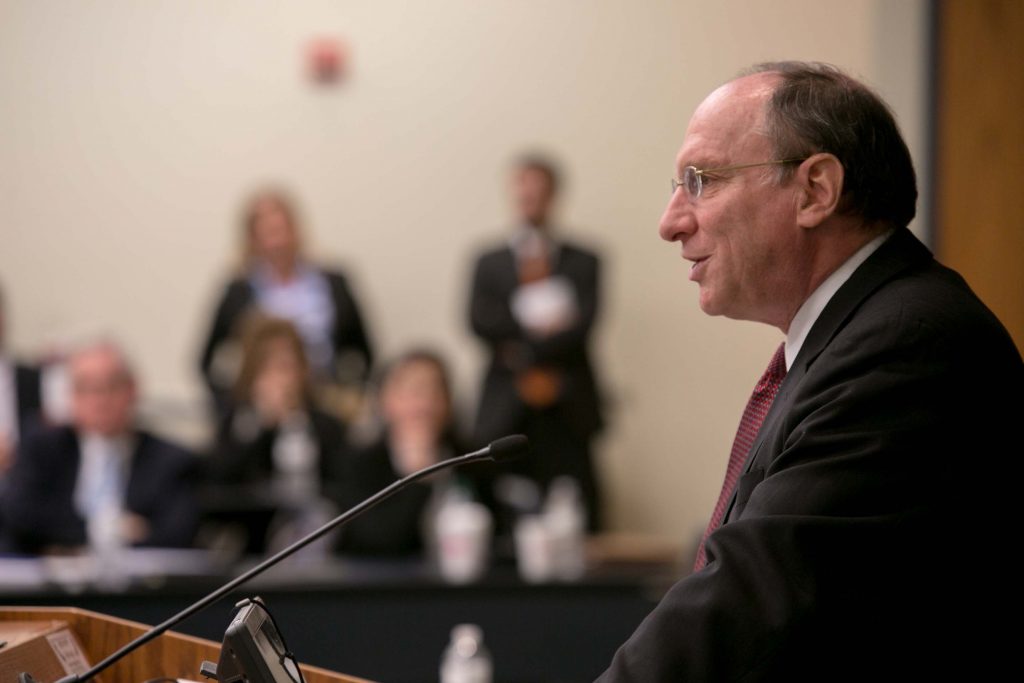An important part of what makes our modern democratic-republican system one that is of laws and not of men is its emphasis on dispassionate justice and fair treatment of the accused. However, where justice is an ideal, imperfection is the lot of human beings, and though great progress has been made throughout our republic in the treatment of those accused and convicted of criminal acts, great progress still urgently remains to help ensure they re-enter society as law-abiding citizens with reasonable hope for the future.
Such was the general theme of a day-long symposium on criminal justice reform presented by the Rappaport Center for Law and Public Policy at BC Law on February 21. Fourteen senators, judges, advocates, educators, district attorneys, and a former attorney general—most of them from Massachusetts—discussed wrongful convictions, reducing recidivism, and ideas for sentencing reform. Some of the participants spoke to a plan released that morning at the State House by Massachusetts officials to stanch the flow of individuals returning to jail.
The Keynote address was given by Massachusetts Supreme Judicial Court Chief Justice Ralph D. Gants (video below).
Named to the SJC in 2009 and as Chief in 2014, Gants served as co-chair of the Access to Justice Commission from 2010-2015, and has been a vocal public opponent of mandatory minimum sentencing in drug possession cases.
In his speech, he took a forward-looking approach to the challenges and possibilities in criminal justice reform. “It is an enormous challenge to craft policy proposals that are acceptable to all where there are important differences of opinion among those who are involved,” he said, “and as such, the proposals and policies that come from reform efforts are limited by the need for consensus.”
He emphasized the pressing need to invest community resources in programs that reduce criminal activity as a whole. “The critical metric is not the number of arrests, but the reduction in crime,” he said, crediting a substantial reduction in crime and gang-related activity in the City of Lowell to “teamwork, imagination, and investment of resources in kids who were 16-24.”
When the officers and civil servants on the ground come together and induce cooperation with the local communities, those same communities reap the rewards, he observed. Healthy, safe communities are built on true leadership, not repression.
Setting forth “elements that would constitute a touchdown in criminal justice reform,” Gants called for a change in what probation and parole do, and held that adequately funded recovery, education, and assimilation programs would be far more effective and economical than existing methods in decreasing recidivism. “Parole programs cost $20,000 per participant, prison terms cost over $50,000 per participant,” he said.
One of the biggest challenges for parolees are what Gants referred to as “needless collateral consequences” and the imposition of fees that make it difficult for them to get back on their feet. The justice system must also be careful, he warned, to not find itself “imprisoning people just because they are poor.” A recent group studying fines and fees reported “serious issues with the system’s fee scheduling that might be pushing the indigent to re-enter the criminal world just to get themselves and their families by,” Gants said.
He recommended an amendment to or the elimination of a statute that authorizes imprisonment for the nonpayment of a court fee or fine. Furthermore, as a matter of constitutional law, “no person should be put into jail for the inability to pay a court fee, and there should be an obligation to hold a hearing regarding the ability to pay before any decision is rendered regarding the willful obligation to pay that fine,” he said.
“Every crime is different, and every sentence should be different,” Gants continued. After all, the purpose of a personalized, human system of justice is to “craft individualized sentences that fit the specific crime committed, and that fit the defendant before the court.”
Every court and every judge should have the individual in mind when coming to the bench, and “take concrete steps to ensure that the sentence and the system does all it can to introduce the individual back as a law-abiding member of the community,” Gants concluded.
Among the event’s panelists and speakers were Chief Justice Mark Martin of North Carolina, Massachusetts State Senator William Brownsberger, former Massachusetts Attorney General Scott Harshbarger, Boston Bar Association President Carol Starkey, former Suffolk County Sheriff Andrea Cabral, and Suffolk District Attorney Dan Conley. Professor R. Michael Cassidy, faculty director of the Rappaport Center, moderated.


